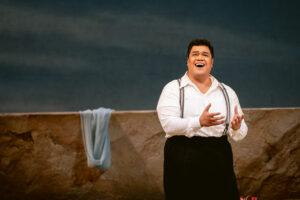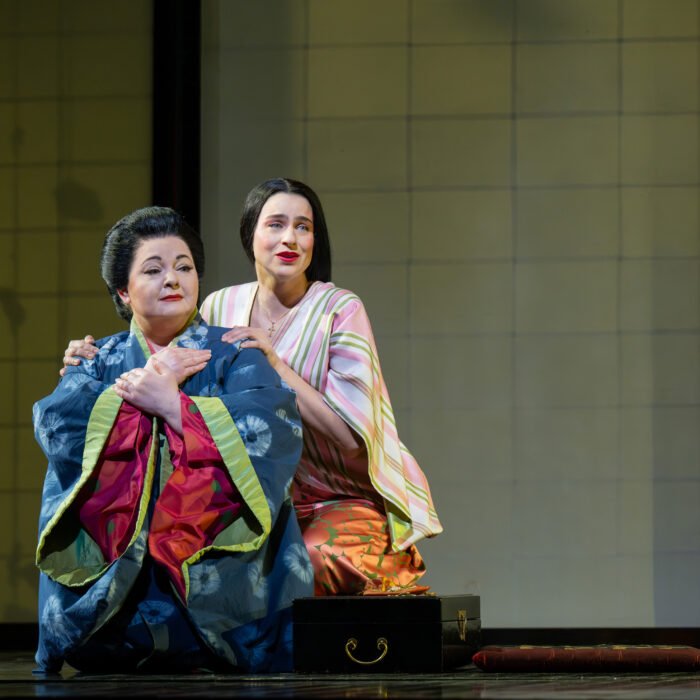
San Francisco Opera 2023-24 Review: The Elixir of Love
By Lois Silverstein(Credit: Kristen Loken / San Francisco Opera)
San Francisco Opera ended its Fall Season by going back to basics with Donizetti’s “L’Elisir d’Amore,” boy loves girl, girl not at all sure about boy, charlatan quack-doctor with his “magical elixir” will cure that, comic hi-jinx, chorus of happy men and women, hotel by the sea, hot air balloon, motorized vespas, and splendid music. What could be better? Opera as it once started out to be. The crowd was happy, and so were the singers. As the curtain came down, everyone was smiling, or whistling, or nodding, at the job well-done. A pretty picture all around. Correct and tidy. Another gold star on the roster.
The production, set in the 1950s on the Italian Riviera, was designed by director Daniel Slater and associate director and choreographer Tim Claydon, with production designed by Robert Innes Hopkins, the same designer of San Francisco’s new “Tosca” and “La Traviata.” Lighting was by Simon Mills. Novel additions were the motorbikes and the hot-air balloon. Charming additions which brought the story up to the 20th versus the 19th century in which Donizetti’s frothy piece first appeared. As is typical these days in performance, the overture was illustrated with a brief preview of what was to come in the production, Nemorino as waiter on stage and Adina as owner of hotel, with her book. For some of us, this was not quite a spoiler but a distraction from the music itself. Why not let the music speak for itself?
Strong Singers
The singers were led by tenor Pene Pati as the young Nemorino, who came through the performance appealing and full of sweetness. Pati appeared in San Francisco as the Duke of Mantua in “Rigoletto” in 2017. He debuted as Nemorino in Paris Opera in 2021. His voice grew in confidence throughout the performance, particularly as he grew in ease from his early “Quest’Amore” in Act one, where his voice started out thin, light-white and tentative. By the end of the Act however, he slipped into his role with more solidity in his rich vocal range. He seemed at ease with his mugging in the second act, his increased contact with the tasks at hand, e.g., flirtations with girls at the hotel, his gulping of Dulcamara’s potion, his stepping up his romancing of Adina, without watching his own back, his total commitment to the multiple arias he had to sing, and the full sweetness of his voice. The “pièce de resistance” was, of course, in Act two with “Una Furtiva Lagrima.” Although the conductor had to stop the music and talk to the audience at its outset, because of an obtrusive ring of a cell phone, Pati was able to handle the interruption and sing with grace. Again he began from upstage, again with a slightly too low piano sound, but as he continued to move downstage, he sang with full voice, vocal variety and luster. He gave a tender and personal rendition of the well-known aria,”Una furtive lagrima,” singing with apt pensive expression then opening to a more expansive plangent ring. The audience greeted the endearing delivery with more than substantial applause. By then, Pati seemed completely in his element.
Adina, deftly sung by soprano Slávka Zámečniková, in her American debut, comes fresh from performances in Vienna such as Susanna in “Le Nozze di Figaro,” and Michaela in “Carmen,” among others. As the boss of Hotel Adina on the Riviera, she entered in silky mauve pants and contrasting print top, and presented herself as a cut above the ordinary crowd. No warm and fuzzy female in conventional dress, Adina had her head in a book while she sang “Della crudele Isotta,” apparently derived from “Racconti di Wagner,” telling the story of Tristan and Isolde, which Wagner had yet to write and produce, i.e., 1865. Another detail emphasizing the updated production. She sang with ease and flexible beauty of voice. This tessitura matched her physical dynamics on stage, springy and agile, centered as it was in the upper part of her body. She had much spring in her voice as in her steps. The emphasis was on her detachment rather than her emotional commitment, fitting with her characterization. Her voice didn’t let her down. As she cavorted around the stage with the hop, skip and jump of a butterfly, rejecting the affection of Nemorino cool and aloof, her voice led her exactly where she wanted to go. We were reminded that love is blind when we listened and watched his appealing persona. Why did he want to pair up with her? He was so much more agreeable. Once she realized, however, she was seemingly not on Nemorino’s hit list, she did a lot of hand-wringing. She moped and slunk around a little like a rag doll, a wallflower. Poor me. The fact that her whole performance rested on the top two thirds of her body rather than the lower third, made this easy to communicate. We had to wait until her self-revelation and public disclosure to see the buoyant aspect of her persona achieved. Then, the final Adina appeared, bright, adorable. They finally made an appealing team.
Dulcamara was sung by Italian baritone Renato Girolami, who garnered praise for his earlier performance of it this year at Glyndebourne. He played the con-man, the charlatan with pzsazz, generating multiple laughs throughout by unpacking a familiar roster of antics. Which he wanted as a character as well as the money for his bottles of potion. Serbian baritone David Bizic was the attractive military officer, Belcore, who wooed Adina and thus stoked Nemorino’s jealousy. Suave and cunning, singing with vocal ease if a wee bit thick at times, he was a perfect match for our heroine. First-year Adler Fellow soprano Arianna Rodriguez made her role debut as Giannetta in lively fashion. The non-singing role of the Mate was performed by Randy Lee and Dulcamara’s Assistant was Aidan Politza.
Potent Musical Leadership
Once again, the Chorus, directed by John Keene, provided ample, deft and actualized parts as hotel guests. From the Tour Group to the painter to the various couples flirting and romping, the stage business remained charming and convincing throughout. Diction, once again, sometimes seemed subordinate to these actions, but with the supertitles this never became a real problem. In Act two, a few “inebriated” girls seemingly “fell off the porch/veranda” onto the stage and then quickly retreated. Were they going somewhere and just changed their minds? No matter, for the overall activities absorbed this, if it were a faux pas, without a hitch. Otherwise, the array of activities didn’t do much to amp up the élan of the piece, and sometimes it seemed as if the group played as if they were having a good time rather than having one.
The production was conducted by Ramón Tebar of Spain, making his company debut in the same opera that marked his debut with Barcelona’s Gran Theatre del Liceu. Spain’s Opera World gave him kudos for that production, totally in keeping with the singers and their humorous characters. The music remained upbeat if not consistently robusto. One might have liked it even more, if so, loved it even, beyond what one already did; all the ingredients were there. In addition to the orchestra, there was a fortepiano played off-stage and a bassoon solo accompanying Pati’s “Una furtiva lagrima.” Further, there was an offstage trumpet in Act one and an onstage banda in Act two with trumpet, tuba, piano, and triangle, played by Nemorino himself. This was a nice touch. Offstage drumrolls were pre-recorded as were the racing sounds of the Vespas.
This was a festive occasion to end San Francisco Opera‘s Fall season, “The Elixir of Love,” and all who attended the opening savored its high-spirits and well-coordinated musical artistry and flair.


